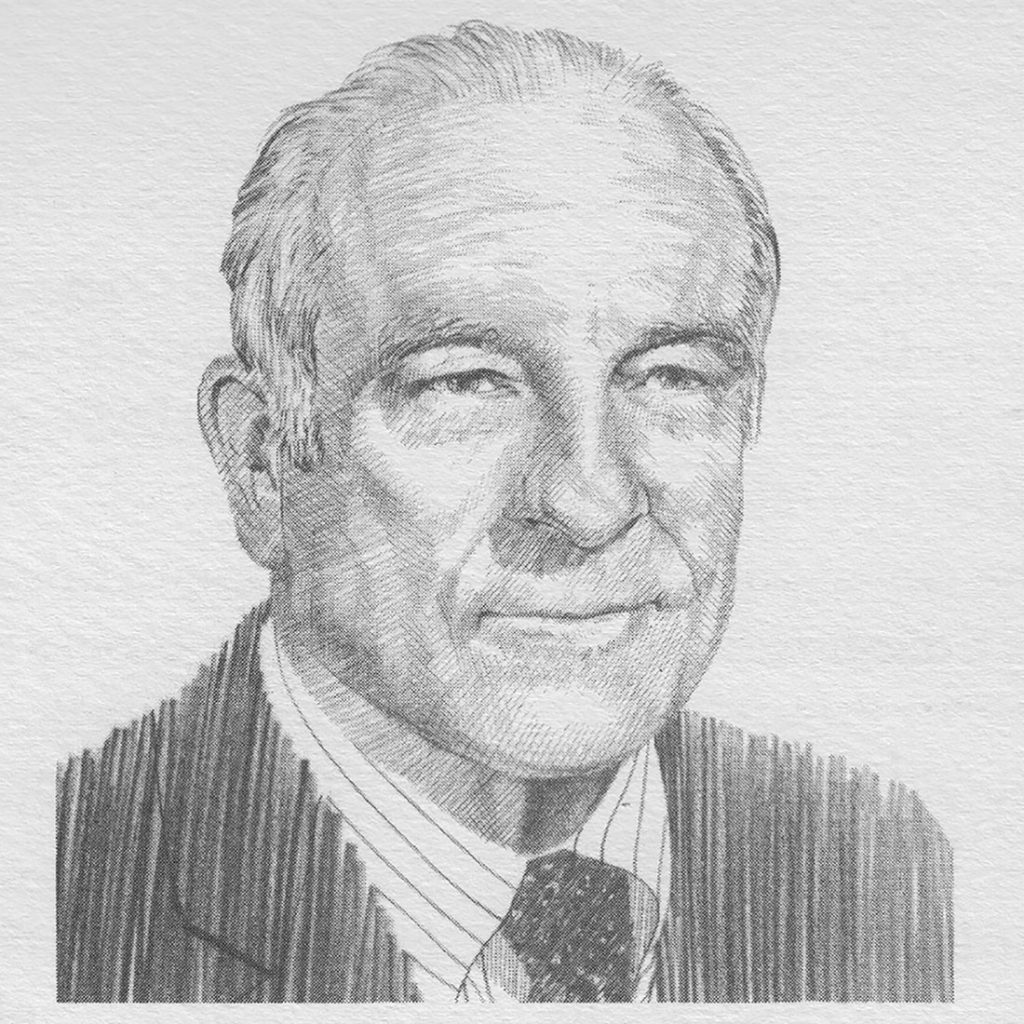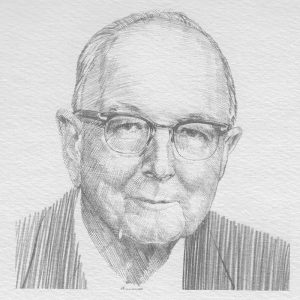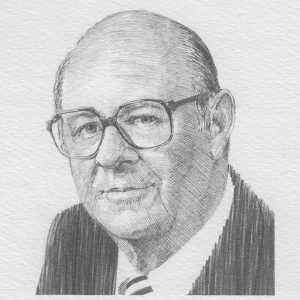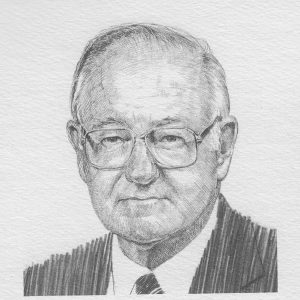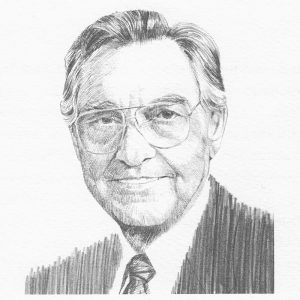Frank McCorkle Moody has said that “a bank is nothing but a shadow of its administration.” During his fifty years with First National Bank of Tuskaloosa (now AmSouth Bank of Tuskaloosa), he set an example of excellence through his leadership in Alabama Banking; through his community service; and through the financial support of educational, cultural, and other worthy causes in the community.
This model citizen, as he has been called, was born in Tuscaloosa, Alabama, on September 25, 1915, the son of Frank Maxwell and Sarah (McCorkle) Moody. He received his elementary education in public schools and his secondary education at Episcopal High School in Alexandria, Virginia. He then entered The University of Alabama and graduated with a B.A. degree in Economics in 1937. (He later did post-graduate work at the Finance School, Duke University, and in the Graduate School of Banking, Rutgers University).
After graduation from The University of Alabama, Frank Moody decided to follow in the footsteps of his forebears and pursue a career in banking at the First National Bank of Tuskaloosa (FNB). His great-grandfather (Judge Washington Moody) had established FNB in 1871; his grandfather, Frank Sims Moody, had led the bank for forty years; his father, Frank Maxwell Moody, was in 1937 the leading executive.
Frank McCorkle Moody would become the fourth member of the family to lead the First National Bank. But, he would climb to the top in an old-fashioned way. His first job in 1937 was in the bank’s proof department.
When the United States entered World War II in 1941, Frank Moody joined the U.S. Army Air Force and served until 1945 when he was honorably discharged with the rank of Captain.
The young veteran returned to Tuscaloosa where he became an assistant cashier at FNB. By 1949, he had become executive vice-president. By 1956, he was made president and CEO. In 1970, he became both CEO and Board Chair man, positions he held until he retired in 1987. Upon his retirement, he was named Chairman Emeritus of AmSouth Bank of Tuskaloosa, and still serves in that capacity. Frank Moody has said that investments in time and money are part of a “two-way street, … what helps community growth helps banks Communities that don’t
have aggressive banks don’t do much.” A bank must be “a catalyst and a leader.”
First National Bank has been a catalyst for growth since 1871 when Frank Moody’s great grandfather along with eight prominent citizens formed the bank. The bank’s credit was largely responsible for helping Tuscaloosa begin reconstruction. Under the leadership of Frank Moody’s grandfather and father, FNB continued to be a catalyst for growth in the West Alabama area as “a friend of the farmer.” When Frank McCorkle Moody became the fourth Moody to head FNB, the focus changed to commercial activity; and the bank became the leading bank in West Alabama, with at least ten branch banks. In the 1980s, with increasing competition in the banking industry and with powerful statewide banks in every community, Frank Moody felt that FNB’s potential for growth was decreasing. Thus, it was decided that the bank be sold to AmSouth Bancorporation. In 1987 Frank Moody oversaw the transition of Tuscaloosa’s strongest hometown bank, First National Bank of Tuskaloosa, to AmSouth Bank of Tuskaloosa.
During his years at First National Bank of Tuskaloosa, Frank Moody always stressed the importance of service and leadership. He personally set the example for the bank.
Frank Moody served in various leadership positions in the Alabama Bankers Association as well as the American Bankers Association. He also served as a member of the advisory board of the Federal Reserve Bank of Birmingham. For many years, he was a director of the Alabama Power Company, and a director and partner with R. L. Zeigler Co., and Creative Displays, Inc.
He has given his time to the community as president and member of the board of the Chamber of Commerce. As chair of the Chamber’s Aviation Committee, he spearheaded the paving of the runways at Tuscaloosa’s airport. He has also served as Chairman of the Board of Druid City Hospital (now DCH Regional Medical Center) and on the Tuscaloosa Housing Authority Board and the Tuscaloosa Development Board. For twenty-five years he was a board member, and also served as a chairman, of the Alabama State Mental Health Authority.
He has been president and chairman of the Tuscaloosa United Fund Drive; an active member of the Black Warrior Council of the Boy Scouts of America and also of the vestry of Christ Episcopal Church. He is a member of the University Club of New York City.
At his alma mater, Frank Moody has served as a member of the President’s Cabinet and the Board of Visitors of the College of Commerce and Business Administration. At Stillman College, he has served on the Board of Trustees and the executive committee.
During Frank Moody’s tenure at FNB, the bank established an employee welfare fund to encourage giving to educational, cultural, and other worthy causes. The resulting contributions, combined with money donated by the bank, had totaled over $3 million when Frank Moody retired.
The Moody family’s interest in the arts led to the construction of two facilities on The University of Alabama campus. Frank Moody, two sisters, and FNB contributed substantially toward the construction of a music building. Named the Frank Moody Music Building, it honors not only Frank McCorkle Moody but also his father and grandfather, also named Frank Moody.
And another UA facility, the Moody Gallery of Art, has been dedicated to honor his Mother (Sarah McCorkle Moody), a staunch supporter of the arts.
For his leadership and service, Frank McCorkle Moody has often been recognized. For example, in 1991, he was inducted into the Alabama Academy of Honor. His name was added to the list of other prominent Alabamians whose contributions, in a variety of areas, have greatly enriched Tuscaloosa, West Alabama, and the state.
In 1992, he and his wife Gloria were the recipients of the Frances S. Summersell Award and they were selected to ODK (leadership honorary) at his alma mater.
In 1986, he was awarded an Honorary Doctorate of Humane Letters by Stillman College; and in 1979, an honorary LLD. from The University of Alabama.
Other honors include the Silver Beaver Award from the Black Warrior Council of the Boy Scouts in 1987; the “Business and the Arts Award” presented by the Society for the Fine Arts (to Frank Moody in conjunction with FNB) in 1984; and a tribute – “To Tuscaloosa’s Finest,” placed in the Congressional Record by Richard Shelby on March 15, 1984.
In 1958, Frank Moody received the Tuscaloosa Citizen of the Year Award, and in 1957, he was named “Number One Boss” by the Business and Professional Women’s Association.
After Frank Moody announced that he would retire on June 30, 1987, the Tuscaloosa City Council proclaimed May 28 as Frank Moody Day. The Council’s resolution cited, among other things, Frank Moody’s leadership and “dedication to the economic growth and prosperity of the area and the meeting of humanitarian needs.”
The president pro-tern of the Council said that “rarely does one have an opportunity to see an individual who fits the mold of a model citizen… Most people know him as Frank Moody, but a lot of people call him ‘Mr. Tuscaloosa.'”
He and his wife, Gloria, are the parents of six children and five grandchildren.

